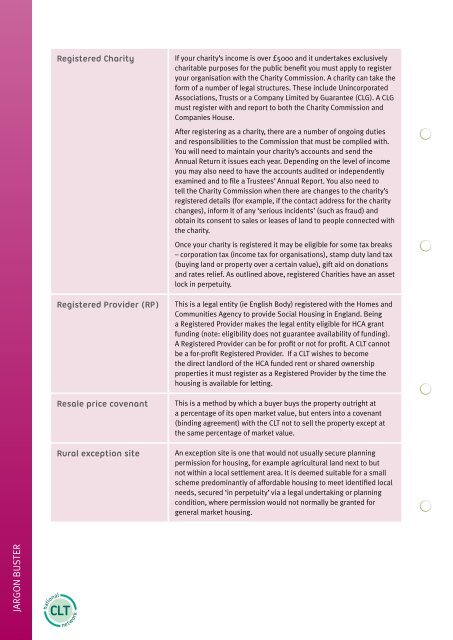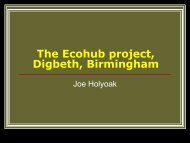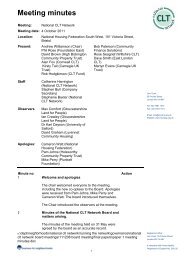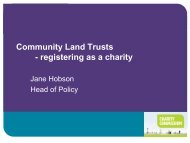CLT Jargon Buster (pdf) - Community Land Trusts
CLT Jargon Buster (pdf) - Community Land Trusts
CLT Jargon Buster (pdf) - Community Land Trusts
Create successful ePaper yourself
Turn your PDF publications into a flip-book with our unique Google optimized e-Paper software.
Registered CharityRegistered Provider (RP)Resale price covenantRural exception siteIf your charity’s income is over £5000 and it undertakes exclusivelycharitable purposes for the public benefit you must apply to registeryour organisation with the Charity Commission. A charity can take theform of a number of legal structures. These include UnincorporatedAssociations, <strong>Trusts</strong> or a Company Limited by Guarantee (CLG). A CLGmust register with and report to both the Charity Commission andCompanies House.After registering as a charity, there are a number of ongoing dutiesand responsibilities to the Commission that must be complied with.You will need to maintain your charity’s accounts and send theAnnual Return it issues each year. Depending on the level of incomeyou may also need to have the accounts audited or independentlyexamined and to file a Trustees’ Annual Report. You also need totell the Charity Commission when there are changes to the charity’sregistered details (for example, if the contact address for the charitychanges), inform it of any ‘serious incidents’ (such as fraud) andobtain its consent to sales or leases of land to people connected withthe charity.Once your charity is registered it may be eligible for some tax breaks– corporation tax (income tax for organisations), stamp duty land tax(buying land or property over a certain value), gift aid on donationsand rates relief. As outlined above, registered Charities have an assetlock in perpetuity.This is a legal entity (ie English Body) registered with the Homes andCommunities Agency to provide Social Housing in England. Beinga Registered Provider makes the legal entity eligible for HCA grantfunding (note: eligibility does not guarantee availability of funding).A Registered Provider can be for profit or not for profit. A <strong>CLT</strong> cannotbe a for-profit Registered Provider. If a <strong>CLT</strong> wishes to becomethe direct landlord of the HCA funded rent or shared ownershipproperties it must register as a Registered Provider by the time thehousing is available for letting.This is a method by which a buyer buys the property outright ata percentage of its open market value, but enters into a covenant(binding agreement) with the <strong>CLT</strong> not to sell the property except atthe same percentage of market value.An exception site is one that would not usually secure planningpermission for housing, for example agricultural land next to butnot within a local settlement area. It is deemed suitable for a smallscheme predominantly of affordable housing to meet identified localneeds, secured ‘in perpetuity’ via a legal undertaking or planningcondition, where permission would not normally be granted forgeneral market housing.JARGON BUSTER






